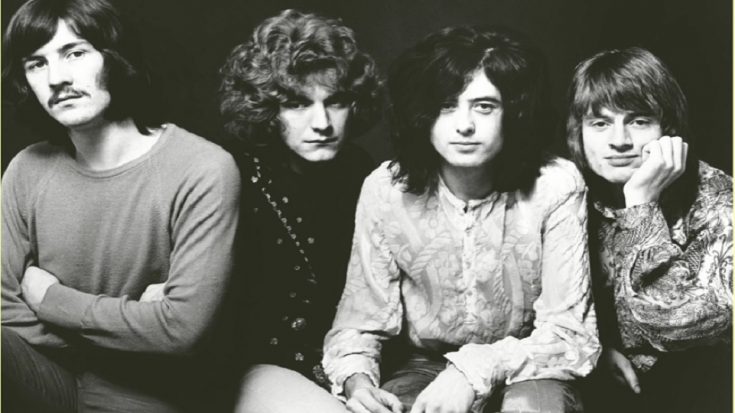Tragic Facts and Stories In Led Zeppelin’s Career

via The Beat Goes On / YouTube
Led Zeppelin, the iconic rock band that emerged in 1968, is synonymous with rock ‘n’ roll grandeur and musical brilliance. Comprising Jimmy Page, John Paul Jones, Robert Plant, and John Bonham, Led Zeppelin skyrocketed to international stardom in the 1970s. Their electrifying live performances, genre-defying music, and enigmatic aura set them apart from their contemporaries. However, beneath the glitz and glamour, the band was haunted by tragic events and personal struggles that often cast a shadow over their legendary status. In this article, we delve into the darker side of Led Zeppelin’s journey, unearthing cautionary tales of rock excess, untimely deaths, and the lingering belief in a supposed curse.
Robert Plant’s Early Stage Fright Struggles
Led Zeppelin’s frontman, Robert Plant, battled crippling stage fright as a young performer. Critics targeted Plant, the band’s face and voice, with harsh comments about his stage presence and appearance. Band manager Peter Grant shielded him from negative reviews, and Plant’s anxiety required comforting to step on stage. These challenges affected his confidence and initially led to lower pay and no album credit. However, Plant ultimately conquered his stage fright, becoming an iconic rock frontman.
John Paul Jones’ Close Call in Hotel Fire
During Led Zeppelin’s 1973 tour in New Orleans, bassist and keyboardist John Paul Jones found himself in a life-threatening situation. While staying at the Royal Orleans Hotel, a fire broke out in Jones’ room after an improperly extinguished joint ignited the bed sheets. Firefighters intervened just in time, rescuing Jones and a friend named Stephanie, who were found unconscious and partially undressed. Despite differing accounts, the incident highlights the potential danger they faced that night. Jones reflected on the incident, acknowledging the critical role of the fire department in saving their lives.
Led Zeppelin’s Infamous Robbery on U.S. Tour
On the final night of their American tour in 1973, Led Zeppelin faced an unexpected and bizarre incident. Just before their show at Madison Square Garden in New York City, tour manager Richard Cole discovered that the band’s safety deposit box at the Drake Hotel had been emptied of over $200,000. The theft, suspected to be an inside job, raised alarm and led to a thorough investigation by the FBI. Despite the scrutiny and speculation surrounding the incident, the case remains unsolved, leaving the band and their entourage puzzled and searching for answers.
John Bonham’s Battle with Anxiety and Depression
Led Zeppelin’s drummer, John Bonham, faced a hidden struggle behind his bold stage persona. While on tour, Bonham grappled with intense feelings of homesickness and depression, missing his wife and children who remained in England. To cope, he turned to heavy drinking, which often fueled destructive behavior and earned him the nickname “The Beast.” Bonham’s anxiety was amplified during touring, particularly his fear of flying and recurring panic attacks before performances. Despite his larger-than-life presence on stage, Bonham carried the weight of his inner battles throughout his career with Led Zeppelin.
Led Zeppelin’s Perilous Live Performances
As Led Zeppelin’s fame soared, their larger shows brought unforeseen dangers. In a notorious incident at the Vigorelli Stadium in Milan, Italy, a crowd of 15,000 fans disregarded pleas to stop starting fires. Riot police intervened, using tear gas and water cannons, resulting in injuries and chaos. The band was forced to flee the stage amidst the turmoil, leaving behind their equipment. This event marked the beginning of a series of perilous performances.
During their 1977 American tour, gatecrashers led to multiple arrests, while a rain-shortened show in Tampa, Florida, sparked violent riots among a massive crowd. Tragically, in Cincinnati, Ohio, a fan fell from an upper level during a concert, resulting in a fatal accident. Led Zeppelin’s journey was punctuated by incidents that highlighted the challenges of managing massive audiences and the risks associated with their electrifying performances.
Led Zeppelin’s Challenging American Tours
Led Zeppelin’s incredible success in the United States led to a relentless schedule of 11 tours in just 12 years. However, each tour brought its own set of difficulties. Being away from their families for extended periods took a toll on the band members’ mental well-being. Additionally, they faced numerous challenges, including encounters with the police, civil unrest, rowdy audiences, stolen guitars, confrontations with armed individuals, and the excesses of the rock ‘n’ roll lifestyle.
Initially enchanted by America, the band’s perception shifted over time. The country lost its appeal, leaving a sense of disillusionment among the members. The exhausting tours took their toll, leading to a waning enthusiasm. By the end of their career, U.S. tours had become burdensome and joyless, leaving a cloud of melancholy hanging over the band.
Led Zeppelin’s Constant Fear of Death Threats
Led Zeppelin’s rise to fame brought with it a dark side marked by death threats from both obsessed fans and vehement detractors. The band became a target due to guitarist Jimmy Page’s fascination with the occult and his association with Aleister Crowley. Death threats began during their 1973 American tour and continued thereafter, instilling constant fear within the band.
The threats were so pervasive and unsettling that bassist and keyboardist John Paul Jones contemplated leaving the band. Notable incidents included encounters with individuals like Lynne “Squeaky” Fromme, a Charles Manson follower, and a disturbed man who believed Page’s demise was imminent. Led Zeppelin responded by employing a team of bodyguards, including former FBI agents, who provided security around the clock. Page even had private guards stationed outside his hotel rooms due to insomnia caused by the constant threat.
The band’s entourage and security measures aimed to mitigate the risks and protect the members from potential harm in the face of these unsettling death threats.
Led Zeppelin’s Substance Abuse Struggles
Led Zeppelin faced internal turmoil as substance abuse took its toll. Guitarist Jimmy Page’s heroin addiction left him frail and unreliable, while drummer John Bonham sank deeper into a chaotic lifestyle fueled by cocaine and alcohol. This created a division within the band, with vocalist Robert Plant and bassist/keyboardist John Paul Jones distancing themselves from the destructive habits. The band’s later albums reflected this strain, as individual members battled their personal demons.
Robert Plant’s Tragic Loss: Son’s Unexpected Death
Led Zeppelin’s final tour came to a halt when vocalist Robert Plant received devastating news. His young son, Karac, fell seriously ill and tragically passed away. The band immediately canceled the remaining shows, and Plant returned home to mourn. The loss had a profound impact on him, marking a turning point in his life. Plant felt the absence of support from his bandmates, except for drummer John Bonham, leading him to question their friendship. However, years later, bassist John Paul Jones made amends by collaborating on the heartfelt tribute, “All My Love.”
Tragic Loss: John Bonham’s Untimely Death
Led Zeppelin’s hopes for a comeback were shattered in 1980 when drummer John Bonham passed away. His ongoing battle with substance abuse took a toll, leading to his collapse on stage and subsequent demise. Despite his efforts to quit heroin, Bonham struggled with heavy drinking and anxiety medication. On the first day of tour rehearsals, he consumed a fatal amount of alcohol, leading to his accidental death at the age of 32. The band, especially Robert Plant, mourned the loss of their beloved friend and talented drummer.
Peter Grant: The Sacrifice of a Manager
As the formidable manager of Led Zeppelin, Peter Grant dedicated himself to protecting and promoting the band, but it came at a heavy personal cost. His relentless commitment to their success meant sacrificing his personal life. Peter’s wife, Gloria, grew disillusioned with a relationship where the band always took precedence, leading to their separation in 1975. This loss deeply affected Peter, leaving him morally broken and withdrawn.
The tragic passing of drummer John Bonham in 1980 further devastated Peter. Consumed by guilt and grief, he retreated from the music scene, becoming reclusive and plagued by health issues. Though he managed to overcome drug addiction and improve his well-being in the 1990s, his heart problems ultimately claimed his life. On November 21, 1995, Peter Grant passed away at the age of 60, leaving behind a legacy as the fiercely protective manager who sacrificed his personal happiness for Led Zeppelin’s success.
Contentious Reunion Attempts: Led Zeppelin’s Divide
Led Zeppelin’s reunion attempts have been contentious. While Jimmy Page and John Paul Jones expressed interest in reuniting, Robert Plant firmly believes the band ended with drummer John Bonham’s death. Plant’s refusal to participate has frustrated Page, who accused him of playing games. Plant, out of respect for Bonham, feels unable to recreate the band’s magic. Jones also felt hurt when Page and Plant collaborated without him. These tensions have made a full reunion uncertain for Led Zeppelin.
Led Zeppelin’s Tarnished Legacy: Reviled and Beloved
Led Zeppelin’s legacy is often tarnished due to their wild touring antics and accusations of song borrowing, but their negative reputation isn’t entirely fair. Many infamous incidents were attributed to the band’s crew rather than the members themselves. The media and critics targeted Led Zeppelin, while other bands engaged in similar behavior. This contradictory legacy led vocalist Robert Plant to question why they were both reviled and loved by different generations.












